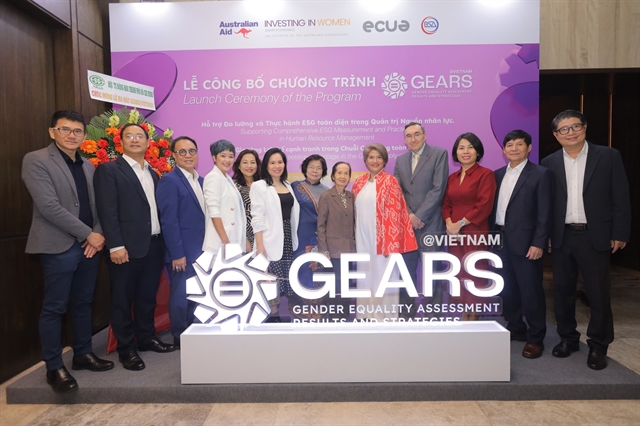Programme launched to help businesses measure and implement comprehensive ESG practices
A programme designed to help businesses measure and implement comprehensive environmental, social, and governance (ESG) practices in human resource management to enhance their competitive edge in the global supply chain was launched in HCM City on January 16.

HCM CITY — A programme designed to help businesses measure and implement comprehensive environmental, social, and governance (ESG) practices in human resource management to enhance their competitive edge in the global supply chain was launched in HCM City on Thursday.
GEARS@VIETNAM, also known as GEARS@VN, is a programme supported by Investing in Women, an initiative by the Australian government aimed at promoting women's economic equality in Indonesia, Myanmar, the Philippines, and Việt Nam.
In Việt Nam, it is implemented by the Centre for Business Studies and Assistance (BSA) and Hà Nội-based social enterprise ECUE.
It aims to raise awareness, enhance skills and support businesses in applying the GEARS (Gender Equality Assessment, Results, and Strategy) assessment framework.
This advanced assessment tool, designed especially for Southeast Asia, is based on a comprehensive diagnostic prototype developed by Australia’s Workplace Gender Equality Agency and partners in Southeast Asia, with the support of Investing in Women.
Speaking at the event, Vũ Kim Hạnh, BSA director, said: "As enterprises embark on their integration journey, it is essential to adapt to global sustainability standards.
“Therefore, in addition to focusing on environmental factors (the 'E' in ESG), BSA has initiated a programme this year to help companies meet the ‘S’ (social) and ‘G’ (Governance) criteria.”
It aims to provide the business community with information and practical solutions to prepare for the rising emphasis on gender equality in the workplace, a critical element of the 'S' in the ESG framework, she said.
“Major markets worldwide are increasingly enacting legislation around these factors, which will impact partners in the supply chain.
“By preparing early Vietnamese enterprises can avoid falling behind and instead gain a competitive edge in the global supply chain.
“Moreover, most importantly, implementing a comprehensive gender equality strategy in the workplace is the key for businesses to attract investment resources in the new competitive landscape.”
GEARS enables businesses to assess and plan their human resource management and development strategies, with results that can be incorporated into their sustainability reports.
GEARS covers 13 aspects related to gender in the workplace and business environment, including recruitment, policies, salaries, promotions, anti-harassment measures, discrimination, and ensuring gender equality in the supply chain.
BSA and ECUE will provide training and run workshops on various topics related to gender equality in the workplace and social inclusion, anti-sexual harassment, unconscious bias, inclusive leadership, and policy advice.
Lê Quang Bình, ECUE director, said: “Participation in this programme allows enterprises to receive validation and solid evidence of their social responsibility efforts, which supports their ESG reporting.”
Through the reports and verification provided by the programme, companies could enhance their brand reputation, attract buyers and succeed in the export market, he said.
"Furthermore, the programme also helps enterprises improve their standing as employers committed to fostering an equal and inclusive environment for employees, thereby attracting top talent in the market.”
Maya Juwita, workplace gender equality director at Investing in Women, said: “GEARS@VN will strategically address key challenges faced by women in the Việt Nam private sector, including by enhancing career development practices, and ensuring safe and supportive working environments.
“Replicating the success in other countries such as the Philippines, Indonesia and Myanmar, we will work with businesses and policymakers to drive systemic change and create lasting benefits for all genders.” — VNS





